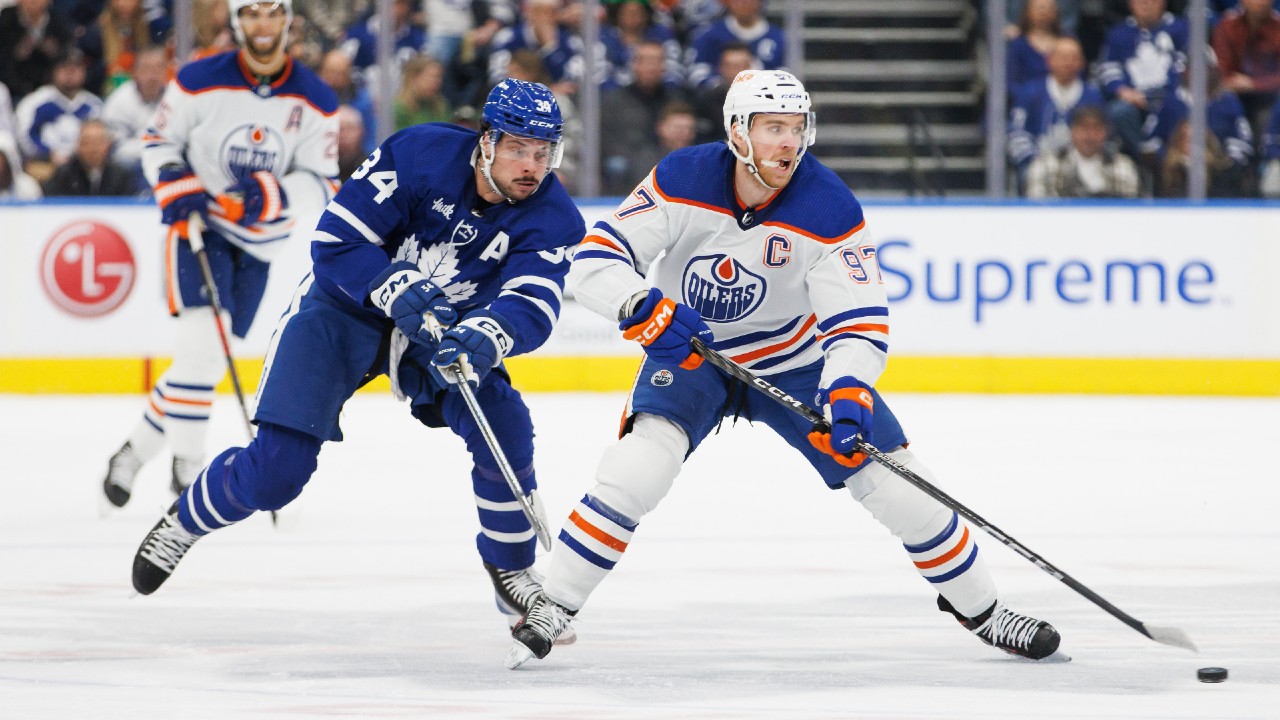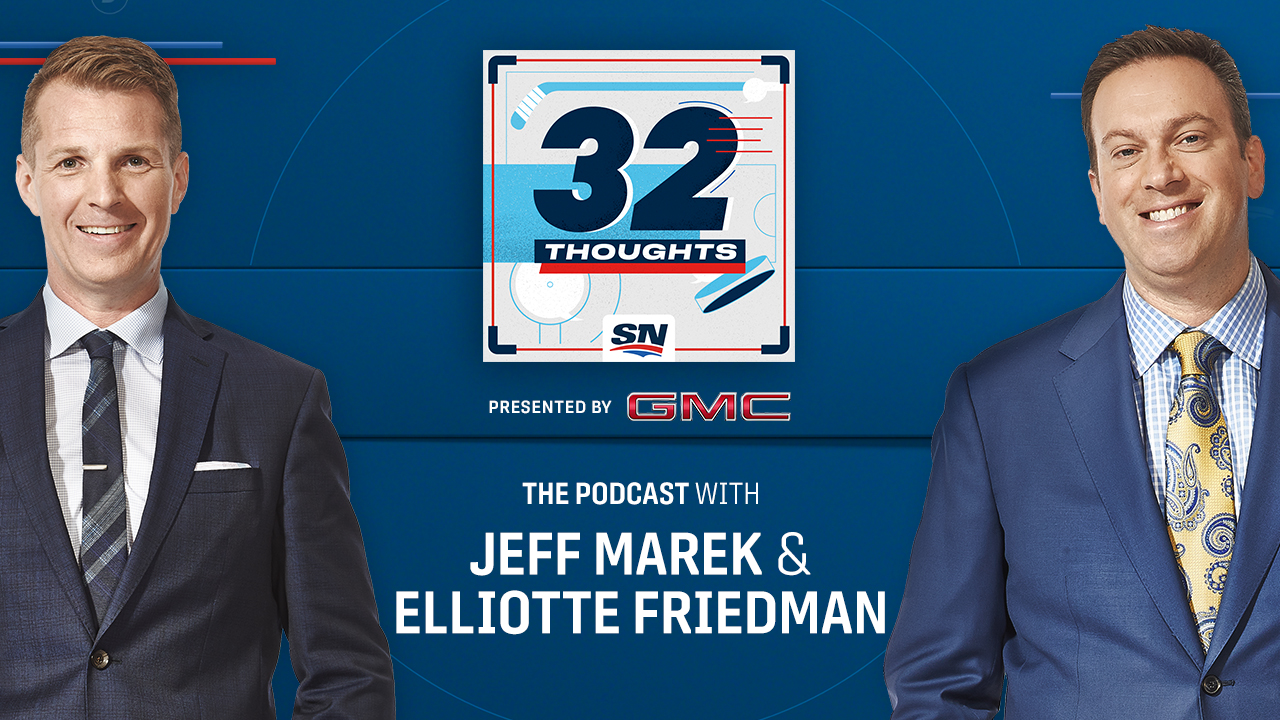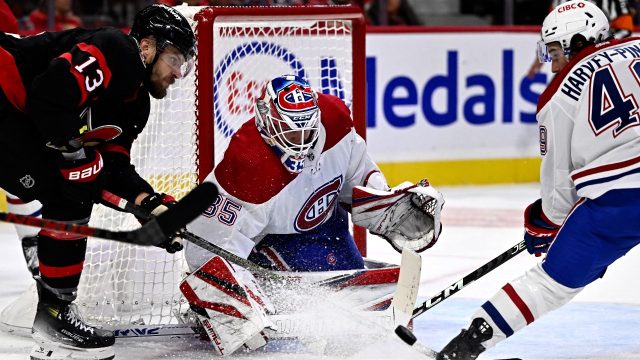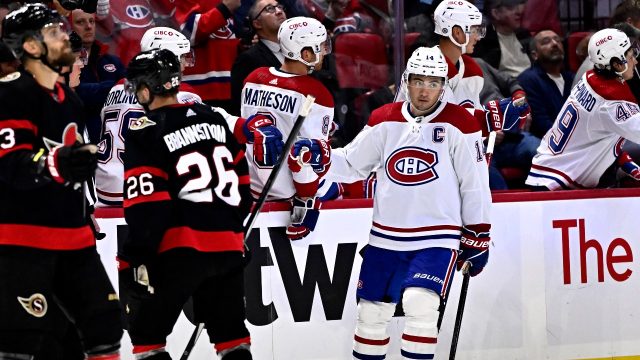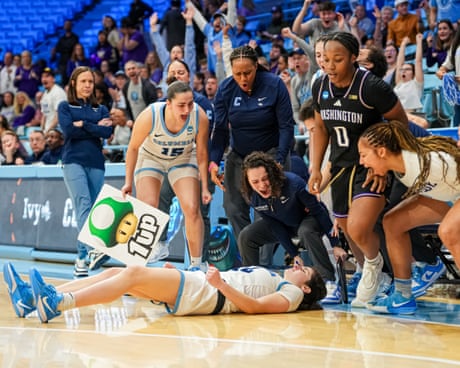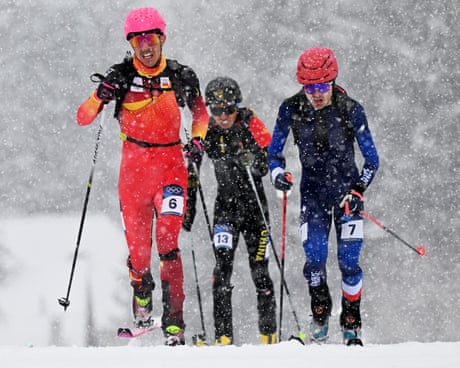
BROSSARD, Que. — Martin St. Louis pulls up a seat in the conference room of the Montreal Canadiens’ practice facility, pops open a carbonated water bottle and settles in for a lengthy conversation. It’s Monday afternoon, less than 48 hours from the first game of the regular season in Toronto and even if his schedule is as jammed as it gets, the coach assures us he isn’t pressed for time.
Less than 20 minutes later, St. Louis makes a similar assertion about his mandate to develop Montreal’s best prospects and return the Canadiens back to prominence.
“If you’re in a rush to do something, you’re not going to do a good enough job,” the 48-year-old says. “If you just want to do things fast, how are you really going to do them right? If you want to clean your car fast, how spotless is it going to be?
“I’d rather take my time and make it as spotless as possible.”
Don’t assume that, just because St. Louis is under contract for two more seasons, he isn’t in a rush to advance the Canadiens in their rebuild. He spends every waking hour consumed with how to do exactly that.
But St. Louis isn’t going to cut corners to get to the desired destination. He’s going to methodically navigate every turn, aiming for precision and perfection to get the vehicle there in pristine condition.
When you consider this was his approach to building himself up from bubble player to Hall of Famer, it would be foolish to suggest he deviate course.
St. Louis is a patient man, and that has served him well in a year-and-a-half behind the Canadiens bench. Over that time, he’s overseen one of the youngest — and most banged up — teams in the NHL, having to incrementally implement his concepts and wait for his inexperienced charges to grasp them before moving to the next phase.
Now, with the Canadiens entering the season a year older, more familiar with his teachings and healthier than they’ve been at any point since his arrival, St. Louis is ready to charge forward.
“We’re diving deeper into some of the concepts, and into the details inside those concepts,” he says.
As for where that will lead the Canadiens this season, that’s anybody’s guess.
But St. Louis is certain of the direction they’re moving in.
“I think we’re capable of taking a big step,” he says. “What does that mean? I don’t know. Does that get us into the playoffs? I don’t know.
“It doesn’t matter. Just work to take a big step, and if you focus on that, usually the winning becomes a side effect. And I’ve said that before, but that’s our culture. We’re just going to keep growing. We’re going to keep getting better and be hungry about being better, and then I feel like the rest sorts itself out.”
Our culture. That’s where our 40-minute interview with St. Louis began.
“Culture” is one of the biggest buzzwords in sports but, as we put it to him, it’s relatively fluffy unless it’s precisely defined.
“I’m not going to go into details of what we value, but I think my players know that there’s non-negotiables,” he said. “Those are pretty simple, but the way you behave yourself around a group, with respect and integrity and your work ethic, is a big part of what makes our culture.”
We didn’t have to ask St. Louis to dig deeper. He went far down the well on this subject, and he expanded on several others throughout the rest of our chat.
What follows is a transcript that’s only slightly edited — and only moderately re-ordered — strictly for the purposes of clarity and flow.
Martin St. Louis (cont’d on culture): You can’t do great things without a good culture, and what defines culture is the choices that you make each and every day. It’s not just deciding, “I’m going to be a good guy today.” It’s acting like a good guy every day, no matter what.
Your culture gets strained and challenged, too. When there’s hard times and somebody’s had a bad game and didn’t feel too good about himself, it’s the responsibility of not just me but also his teammates to take care of him. I think that’s part of our culture. I really think you have to make sure everybody’s in a good place, and if someone’s not in a good place, let’s make sure he gets a touch today. That’s important. And I feel like it can’t just be me keeping an eye on it, it has to be everybody. That’s healthy culture.
And we have that. I’ve had players come to me and say you should talk to this guy or that guy, and when you have that, you feel like you have good culture. My staff will notice something, or maybe they had a conversation with somebody on the ice, and they’ll come up to me and tell me. At the end of the day, we want people to feel good about themselves, regardless of their output, because the better they feel about themselves, the better output they’re going to give. And if they’re not feeling good about themselves, we get to the bottom of it…
Sportsnet: About your specific role in that…
MSL: There are so many things that come into it, but I think the players know that I care about them. I think we have a family environment.
I like them all, but that doesn’t mean I’m not demanding, and it doesn’t mean I’m not telling them the truth.
It’s a lot like parenting. For me, the way I’m parenting and raising my kids, it’s a lot like that. I love my kids, but it doesn’t mean I can’t tell them the truth because, at the end of the day, I want them to become the best they can become. There’s stuff they have to learn as kids, and it’s the same thing as a hockey player. They have to be sponges, and it’s not always going to be that, because I like you, everything’s good. No, my job, our job, is to make them the best version of themselves so they reach their full potential. Just like you would do with your own kid.
SN: When you like and respect someone, you owe them the truth. If you go back to the beginning of last year, it obviously fell much more on the coaching staff to instill that culture. A year later, how much has that culture organically grown because these guys like and respect each other and are willing to tell each other hard truths?
MSL: I sense that from the group. I’m not in the locker room, and I don’t know everything that goes on in there, and I shouldn’t know everything that goes on in there. But I sense that.
At the end of the day, it’s not my team. It’s their team. They have to be accountable, hold each other accountable, and it’s a group decision on how far you want to go with that. It doesn’t matter how far I want to go, it’s on them.
We take care of the people that take of the team, we don’t take care of the team. And, to me, that’s everything. You get to a certain point where the team is coaching itself. You’ve seen that on other teams where the team is coaching itself, and that’s success.
That culture has been established on our team, and now it’s just to bring it to life.
SN: You said that when we sat down last year — that it really takes off when the team is coaching itself. I’m sure you experienced that on the best teams you’ve played for. Are you sensing that the team is taking steps in that direction?
MSL: Yes, I am, because you hear it on the bench. Sometimes I know I want to do a correction — and there’s timing for that because you can’t just correct every play, and I have to establish if it’s a one-off or a trend — but players and their teammates might correct each other on every play.
If I’m the only one doing correction, I’m not giving the opportunity for the team to self-correct.
SN: Now that you’re seeing that happen, how much optimism does that give you for this season?
MSL: I’m very optimistic.
But anything I’ve done in my life has been approached with optimism.
And I shoot high. That doesn’t mean I get what I want all the time. But if you don’t shoot high, you probably guarantee you’re not going to get a high result.
SN: Identity tends to be viewed more through the lens of what’s happening on the ice, whereas culture is about what’s happening off it. What is the identity you want the Canadiens to continue establishing this season?
MSL: Eric, I want us to be a team that’s tough to play against on both sides because we’re organized, we’re playing with some intelligence, and we’re playing connected on both sides. That means you have to work physically, but you have to be working mentally, too.
I don’t want us to be easy to play against, and I feel even just our last two exhibition games, we just weren’t going away. We were playing a good game in Toronto. We had a good start and were playing a really good game, and when it seemed like the game was going to slip away it was, “No, we’re not going away.”
Even in Ottawa, we should’ve been up by a bunch of goals, and we just couldn’t separate. All the sudden, a couple of bounces and some self-inflicted stuff and we’re down, but we just were not going to go away. And it wasn’t like one guy making one special play; it was waves of the group coming and doing the same thing over and over again and making it overwhelming.
That’s how we want to play. We want to be hard to play against. Not just running around and hitting people. That’s not what I mean when I talk about being tough to play against. Physicality is part of it, and every now and then you catch somebody on the train track and probably need to get some physicality in there. But that’s not really what I mean when I talk about being hard to play against.
SN: I think it’s clear “connected” was the key word you used when it comes to being hard to play against.
MSL: Yes, you have to be connected, and on both sides.
We value defending, and to me defending doesn’t just happen in your own zone. You defend as soon as you lose it.
And attacking is the same thing. You don’t just start your offence in the offensive zone. You’re playing offence as soon as you win a puck in your zone.
If you understand that, you’re going to be hard to play against.
SN: This whole idea of connection, of five guys on the ice sharing a brain isn’t new or revolutionary in hockey, but it seems especially critical today with how fast and structured hockey is.
For example, Michael Pezzetta scored a goal in your final pre-season game where it was clear he was connected with the other guys on the ice and filled the one area of space that needed to be filled at that precise second to get a great scoring chance.
When you see a guy thought of as your 13th forward making that read, how much does it tell you that the mental connection has come a long way from when you started hammering home that concept?
MSL: Big time, because Pezz just reacted. There was nothing set there, he reacted.
And that comes from how we practice. He wasn’t told go to a specific spot, he went to where the game needed him to go at that time. To me, that’s what it’s all about.
The game is asking you to do things on the ice at certain times, and you have to be able to see that. You can’t just come in and play your game; you’ve gotta play the game.
The game itself has rules, and I’m not talking about the penalties or offsides or icing. I’m talking about rules of support. Are we in space? Or are we under pressure? Because the rules of support are different for those two scenarios.
SN: The physical demands of being in support all over the ice, the way you want your players to play, they’re much greater based on the speed and structure of today’s game.
MSL: Absolutely. Your brain has to be working and your feet have to be processing what your brain is seeing to get to the right place at the right time. It’s harder to do now. There’s a lot of chess in the game now and, to me, it’s about getting to the right spots at the right time with and without the puck. Sometimes, you get there early, but being on time is better than being there early and flatfooted.
SN: I asked you earlier in camp about the makeup of an ideal winger for Kirby Dach, and you said he’d benefit from playing with a goal scorer because he’s a playmaker. Juraj Slafkovsky could qualify, but when people see Alex Newhook on the other side, they probably see a complement of skill and speed that fits well with Dach. How much of putting him there also has to do with having another player next to Dach who thinks the game at his speed and level?
MSL: That’s so critical, and I think Newy has the intelligence to see what Dacher is seeing too.
And I think Slaf has taken strides in balancing it out. You can see he processes that if those guys are here, now I’ve gotta do my job and play in balance and that I can’t just go where I want to go but have to go where the game needs me to go.
Even then, you might not get the puck, but that guy with the puck now has options because Slaf kept us in balance.
If we play balanced, everyone is usually more open. And if you don’t, you usually allow the other team a lot of time to take stuff away without really working.
SN: How would you characterize Slafkovsky’s desire to learn?
MSL: Very high. And he’s very receptive.
Slaf’s a young guy, and I’m still building a relationship with him. I’m coaching him, but not too hard, not too deep yet. Right now it’s all about that balance and not so much about technique and what he does. It’s going back in forth with him on, “Did you get your touch? Why did you get your touch?” Because why teach a technique if you can’t get a touch?
It’s like the guy who works on his one-timer, and I’m like, “Why you working on your one-timer? I’ve never seen you take one because you’ve gotta get open to be able to take one.”
To me, it’s a sequence of teaching. To me, let’s teach him to get touches.
SN: There’s an incredible patience you must have in that process as a coach, which is in real contrast to the impatience others seemingly have when it comes to the development of a first-overall pick.
You’re under pressure to develop this player quickly into the player you and everyone else think he should be. How do you handle that?
MSL: To me, we’ve just gotta go at the right pace, and he’s going to tell us what that pace is.
If you’re in a rush to do something, you’re not going to do a good enough job. If you just want to do things fast, how are you really going to do them right? If you want to clean your car fast, how spotless is it going to be?
I’d rather take my time and make it as spotless as possible.
SN: Does he get it?
MSL: I think so. I talked to him about being patient. I talked to him about not being so hard on himself.
But with that patience, we can’t just wait. We’re going to be aggressive.
But we have to have the right approach. And he can make mistakes, but you want him to stop making the same ones over and over.
SN: What mistakes have you made as an NHL coach that you’ve learned from, that you won’t repeat?
MSL: I make mistakes.
Sometimes I design a drill that works one way in my mind and ends up very different in execution. And I apologize to the guys when that happens. Sometimes I design a drill that doesn’t accomplish what we’re looking for. It doesn’t happen a lot, but when it happens, I own it.
I don’t know if I’d call them mistakes, but they’re more just learning moments.
Sometimes, with the way I manage the bench, I might lose a guy because of a lot of special teams. I lost a guy because I was so focused on getting the right guys out there, which is important. But you don’t want to lose a couple guys on your bench because you need them for the flow of your game. I’m still getting used to running the bench.
SN: Have you come out of a game at any point and felt like the other coach kicked your butt?
MSL: I haven’t felt that.
I’m not saying it won’t happen, but I haven’t felt that way.
SN: There’s learning and there’s teaching. Are you teaching less now that players are familiar with your concepts?
MSL: No, but we’re not starting from scratch. We’re diving deeper into some of the concepts and the details inside those concepts.
It’s the same thing about talking about coaching Slaf individually. You can’t teach the details to the group until they grasp the concept. Once they fully grasp the concept, then you can get really deep on the details inside of it.
SN: Is there that much deeper to go?
MSL: Yes, because teams are going to make adjustments and we’re going to have to adjust off their adjustments.
That’s my favourite part.
SN: What did you learn in last year’s training camp that helped you structure and run this one to prepare for a better start to this season?
MSL: I did it similar to last year, but the schedule was harder last year. And last year I felt I was starting from scratch, but this year I wasn’t starting from scratch.
There was probably a lot of repetitive stuff for some of the guys, but that’s alright because they were away from it for five months. Reminders help.
It was good, and I learned that, in coming back with pretty much the same group, we’re further along.
This last week was great for us.
SN: What was great about it?
MSL: You get to a smaller group and diving into the details of the concepts, and you start having individual discussions, and we got to gather in Tremblant for three days and have team bonding, which I think has so much value. It has an impact — that time we’re together. It has an impact on what’s next for us.
SN: What makes a power play good, and how do you get it there?
MSL: We didn’t really work on the power play last year because it didn’t really matter, because we weren’t ready to win. We focused on five-on-five, and you can tell our five-on-five game in pre-season was pretty good.
This year we’re diving in more to the special teams. Me and Alex (Burrows) run the power play and I’m as much to blame if it doesn’t do well, but the answers are everywhere, and we’ve got to find them. I know it’s an important part of the game, if we’re going to be successful.
What makes a good power play? It’s a little bit of that one-brain mentality.
But every position on the power play has different nuances of how to play it, and you almost have to teach those positions alone. At first, you’re teaching the five guys together, and we have our concepts about the point of attack. What makes for a good PP is understanding how the other team kills and how do we break that.
Sometimes a PK will break itself. They make mistakes and break themselves.
But can you take advantage of that versus having a set play? You have to find ways to break good PKs, and the way you break a fronting diamond and the way you break a pushed-down formation is totally different.
So, I feel last year we dabbled into learning the rules of how to break different kinds of PKs. Now, once you’ve figured that out and, conceptually, you’re on the same page, now you work on the individuals in their positions and the nuances.
SN: Kirk Muller used to say, “Show me good players, I’ll show you a good power play.”
MSL: He’s not wrong, but that’s only part of it. It’s not all of it.
SN: We finally saw the lines you’ll start the season with. Did you have an idea of how you wanted this picture to look, or did it just develop this way?
MSL: You get steered a little bit. You get steered based on what you see. The game’s always talking to you, and you get steered based on what it says.
SN: It really does seem like you actually do have as many options as you’ve been suggesting you have. Does that mean we’ll see a lot of changes?
MSL: With how I have the lines right now, has any of that not worked in this camp?
SN: No.
MSL: I could do another four different lines, and you’d say the same thing.
I haven’t had one combination so far that hasn’t really worked. So you get steered and follow your gut.
But the beauty is we play 82 games and we know we’re not going to stay the same for 82 games.
SN: But do you have to give it some time before making changes?
MSL: I think it’s day-to-day, and sometimes you get forced to change it because of injuries. We’re starting like that, and we’ll see where it takes us.
SN: What do you think the Montreal Canadiens can do this year?
MSL: To me, it’s not what we’re capable of, it’s more about what we’re willing to do. I know what we’re capable of, but the group will have to decide if they’re willing to do it. I could have all the goals and stuff, but it doesn’t matter because it’s not my team; it’s theirs.
I take care of the guys who take care of the team, and we’re going to be organized. But it’s going to be up to them to raise the responsibilities and figure it out.
But we’re capable of taking a big step this year, I feel.
SN: What does accountability mean to you? Another buzzword, but what does that look like to you in action?
MSL: Accountability starts in practice.
When we design drills that replicate the game, if your decision making is loose in practice, it’ll be loose in a game.
For example: at the blue line, do we have the numerical advantage? Because if we don’t, the puck’s probably getting behind us. I don’t care what my players do with the puck. I don’t care if a player wants to take a chance at the blue line, but what’s on the other side of that chance? Do we have the numerical advantage? The risk that you take gets no reward if we don’t.
I think when we design drills, I stop it if we’re not accountable to the rep.
SN: What about holding players accountable?
MSL: That still comes down to, “Make mistakes, but stop making the same ones.”
It also depends on the magnitude of the mistake.
If a player makes a mistake just worrying about his own little self, that’s one thing. But if he makes a mistake where his intentions were good but didn’t work out, you don’t want to punish them for making a good read and not executing.
SN: But the selfish mistakes were forgiven more easily a year ago. Does the rope tighten a bit more now?
MSL: Yes, a little bit, because we’re further along.
I don’t want my players to play tight, but there’s gotta be more accountability.
SN: What’s your wish for the season? What can you accomplish if you guys do remain healthy?
MSL: That we take a big step. I think we’re capable of taking a big step.
What does that mean? I don’t know. Does that get us into the playoffs? I don’t know.
It doesn’t matter. Just work to take a big step, and if you focus on that, usually the winning becomes a side effect. And I’ve said that before, but that’s our culture. We’re just going to keep growing. We’re going to keep getting better and be hungry about being better, and then I feel like the rest sorts itself out.
SN: You’ve spent your entire life trying to be the best. How can you improve as a coach to become the best coach you can be?
MSL: I don’t know yet. I don’t want to give you just an answer.
I know I’m not perfect, but I can’t pinpoint one thing that I need to really get better at. I think I’ve gotta get more reps to really figure that out. I’m sure I have stuff to improve, but there’s nothing that’s really in front of me that’s so big that I’m worried about.
But it might become that, and I’ll know. I think I need more reps to figure out what that is.
SN: What’s the greatest satisfaction you’ve experienced from this position?
MSL: When you see the collective play and how connected we are on the ice, that makes me feel good. To be connected, you need all five guys. If one guy isn’t connected, your percentage of being successful on the ice will drop by 30 per cent. If you have two, it’ll drop by probably 60. So, to me, I love when we’re playing collectively and connected, and I know we are because we helped this guy or that guy who’s now getting it.
SN: Best of luck taking that further this year. Enjoy the season.
MSL: Thank you.


